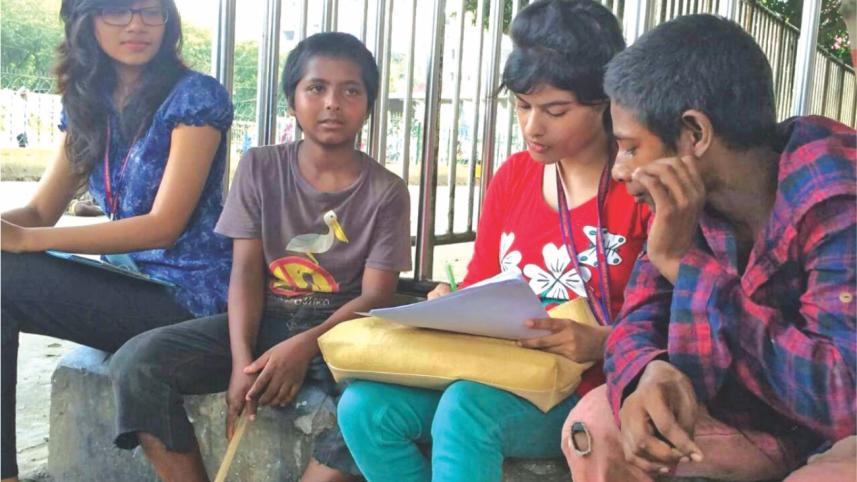Restoring Faith in Humanity

What started out as a course project, turned into a life-changing event for one child, named Pavel, who thought he was damned for life.
Toma Sarker, a student of the English Department of American International University of Bangladesh, was carrying out a survey for her course project. The survey was on the lifestyle of street children. “We covered areas like Shahabag and others. But there were around 40 children we interviewed from Kamalapur Railway Station alone,” says Toma. While interviewing the children, Toma spotted on particular child who seemed a little different. What made him stand out, she cannot tell, but she felt somewhere in her heart that she should pay him some attention. The child, Pavel, was only 6 to 7 years of age. Upon asking him what he does at the station and why he is here, his response was gave a shocking revelation of child trafficking in Bangladesh. He said, “This is not my home. I used to live in Sylhet. Three years ago, a man gave me chocolates and promised me more if I came with him. He brought me to Dhaka and left me with a man who everyone referred to as 'ostad'. He used to beat us all if we couldn't earn money on the streets through begging,” he said. Running away from 'ostad', Pavel brought himself to Kamalapur Railway Station and has been living here since, sometimes as a 'coolie', sometimes a 'tokai'. An eager Toma asked him more questions about his parents and where he lived. “Surprisingly, he remembered every single detail of his life before he was trafficked, despite his young age,” she says. Upon asking him what he wants to be in the future, he replied, “I just want to be a good person and all I want in life is safety.” Toma, realising that Pavel should've had a better future, contacted her friend in the army and told him about Pavel's heartbreaking story.
To her utter disbelief, her friend, through the help of other law enforcement agencies, tracked Pavel's mother, Ayesha Khatun, down. “When she was called and asked whether she wants to see her son, she didn't even believe us. She thought we were playing a cruel joke on her because she was certain that Pavel was dead,” says Toma.
On July 22, Toma went back to the railway station and made Pavel speak to his mother. Three days later, Ayesha made arrangements to come take her son back. On July 27, the day of Toma's presentation of her findings through the survey, Toma skipped class while her friend Subarna Khan tried to handle matters with the teacher, while she went to the station to receive Pavel's mother. “Pavel didn't think we actually managed to bring his mother here. He mistrusted people for so long after that incident that he even asked me if I was taking him to another 'ostad',” she says.
Once Ayesha stepped onto the platform, Pavel didn't take a second to recognise her and run to her. Thus, Pavel's life was turned around, back into his mother's arms.
“People carry out a lot of surveys and do a lot of work with street children, but that is only for grades. They don't try and reach out to them. I saved only one boys life, but there are hundreds and thousands of them being lured away and trafficked into Dhaka city, away from their homes and family,” says Toma.
Let this incident remain as an example of humanity in our minds, so that we all can start making such influential differences towards the future that we all dream of.




 For all latest news, follow The Daily Star's Google News channel.
For all latest news, follow The Daily Star's Google News channel.
Comments